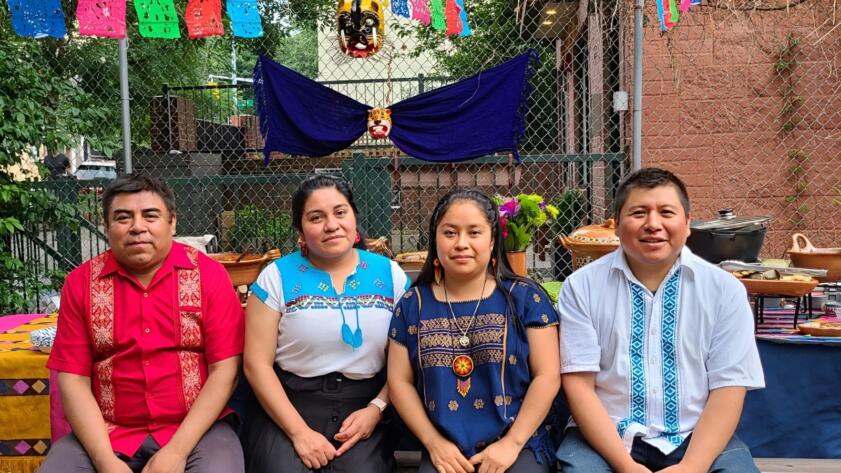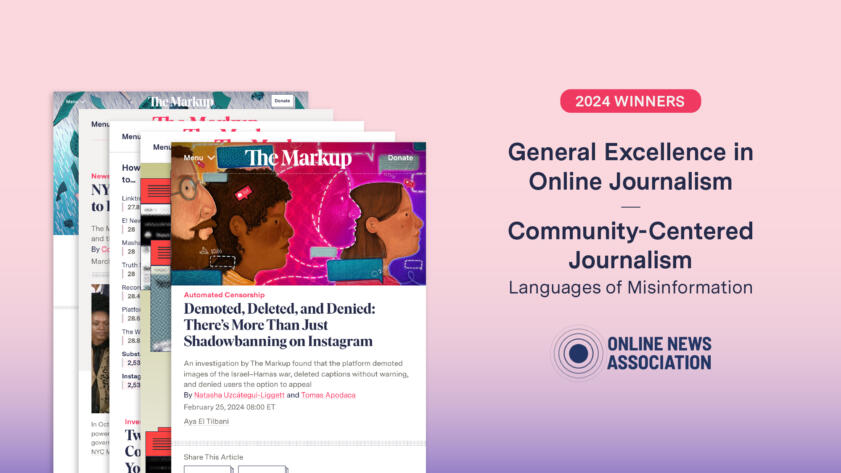The Markup, now a part of CalMatters, uses investigative reporting, data analysis, and software engineering to challenge technology to serve the public good. Sign up for Klaxon, a newsletter that delivers our stories and tools directly to your inbox.
This article is copublished with Documented, a multilingual news site about immigrants in New York, and The Guardian US, which covers American and international news for an online, global audience.
One video told viewers that new migrants easily get work permits and good jobs in the United States. Another warned viewers, once they are in the U.S., not to change their postal address or transfer their asylum case if they move to another state. Another instructed them to re-apply for asylum if they do not receive an acknowledgment letter within a few months.
These videos were all posted on TikTok in French or Wolof, the languages spoken by many of the West African migrants who have arrived in New York City in the last two years.
Documented reviewed hundreds of videos like these. Some aimed to inform, advise or persuade viewers and appeared to be well-meaning. Many featured migrants sharing their first-hand experiences of the asylum process to encourage others in their position, and some filmed candidly in supermarkets, on park benches, or in their cars.
Other videos, however, were not so well-meaning.
An industry of highly coordinated smuggling organizations are using social media apps like TikTok to promise seamless travel services — procuring airplane tickets, helping with visa applications, or providing places to stay during your trip to the U.S. One migrant from the Republic of Congo told Documented he was led by one smuggler to Brazil, where another agent then hosted him for two months in a safehouse with 10 other African migrants and took them onward to Panama by passing through the treacherous Darién Gap.
Documented spoke with five Senegalese men who migrated to New York City in the past year who said that TikTok played a significant role in their decision to make the arduous journey to the U.S. Like thousands of other migrants who have made their way to the U.S. from China, Latin America and West Africa, these five men were inspired by testimonials from other migrants they saw on TikTok about their journeys to the city. And like many other migrants, they were frustrated that the hardship they faced in the U.S. stood in stark contrast to the optimistic videos that inspired them to make the journey. Even after arriving in the U.S., TikTok continues to play an outsized role in their new lives. ByteDance, TikTok’s parent company, did not respond to a request for comment at the time of publication.
In the last five months, Documented analyzed the TikTok viewing history of five Senegalese migrants between 22 to 36-years-old, and who all arrived in New York in the past two years. For many members of this predominantly non-English speaking community, this was the first time they left their home country, and navigating life in New York City felt isolating and filled with incomprehensible rules and uncertainty. TikTok became a valuable place to get information, and provided people with seemingly helpful tips from how to open a bank account to how to pronounce common English phrases.
Documented identified about 300 videos that had been watched by at least three men who shared their TikTok history. Between pranks and soccer clips, the men watched videos that provided either partial or inaccurate content about vital matters like how to fill out legal forms for requesting asylum, that if acted upon, could derail their asylum processes and integration into American society.
In one of the misleading videos, the poster speaks about Mayor Eric Adams’ policies towards the city’s migrant population.
The video, narrated in Wolof, features a man translating and explaining what he claims is a news story. He displays a screenshot of an English headline from the Manhattan Institute website, along with a photo of Mayor Adams.
In the video, the man falsely asserts that Mayor Adams is handing out $50 million in cash to distribute among New York City’s migrant community, urging viewers to “share this video widely” as it could be “life-changing” for immigrants.
Here’s what really happened. In February, Mayor Adams introduced a program providing pre-paid debit cards for migrant families to use on food and baby supplies — not $50 million in unconditional cash payments.
Ass Malick Lo, 30, heard about people taking the Central American route to the U.S. in August 2023, both through social media and some people he knew from his home country of Senegal. He watched live feeds of people on the route as well as pre-recorded videos. He had the contact information of an uncle in New York City and used his savings, borrowed from a friend and sold his car in order to make the trip.
When he arrived in New York, Lo said he was dependent on TikTok — videos helped him escape his surroundings, made him laugh and feel like he was with friends speaking Wolof. The social media app became one of the only sources of information and emotional support he could easily turn to when in doubt.

Languages of Misinformation
He Found the American Dream on China’s TikTok, the Reality Was More Complicated
Videos on China’s TikTok, Douyin, give Chinese migrants step-by-step instructions on how to get to the United States—and then leave them stranded upon arrival
“Migrant influencers are filling a void — sometimes providing hopeful information, but it might not always be truthful,” said Elora Mukherjee, professor of law at Columbia Law School where she directs the Immigrants’ Rights Clinic. Mukherjee said that it’s dangerous to have some of the most commonly reiterated misinformation online about how it is “easy” to travel, seek asylum and work legally in the U.S.
“I was made to believe that when you come, you will have papers and find work, but that’s not the case,” Lo said.
Instead, after filing their application for asylum, migrants must wait at least six months before they can get a work permit. Asylum seekers and local officials have called for reforming work permit eligibility rules as their top priority to ease the burden on the city to shelter and provide for their basic needs.
“We should be a unified front on all levels of government calling for expedited federal work permits to ensure asylum-seekers can legally work,” Councilmember Shahana Hanif said in an Oped in 2023. Congresswoman Alexandria Ocasio-Cortez has called on the White House to produce work permits in an interview with Documented last year. “What we are asking is for the federal government to get out of our way, so that our economy can function and we can integrate new Americans the way New York and New York City always has,” she said.
Made to rely on back-to-back shelter stays, and hand-outs of food, clothing and other daily necessities, in an effort to sustain themselves, asylum seekers sometimes find unauthorized and unregulated short-stint employment like delivering food, loading shipping containers and dishwashing in kitchens.
“It is this built-in waiting period that overburdens the city, and until people are able to work lawfully, instability and often exploitation will continue,” said Mukherjee.
“I’m lucky to be literate. I have come across migrants who missed deadlines for fingerprinting, or appointments with judges because they don’t understand the content of the letters they receive about their asylum cases,” said Lo, who holds a French language bachelor’s degree.
Through his struggles to find stability in the U.S., Lo has grown to understand the harms of misinformation not only for himself but for the Senegalese migrant community he belongs to.
Now, Lo fact-checks the information he gets on TikTok by translating government websites from English to French and following verified news channels on social media.
“I would use TikTok with skepticism and verify the information I see before acting on it, knowing what I know now,” said Lo.









